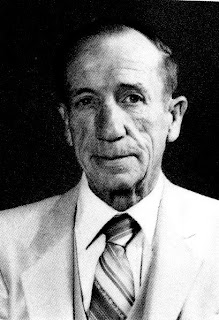
Last week, when I was at the courthouse searching a title, a pleasant young man introduced himself to me as a District Attorney's intern. He was writing a history about all of Northampton County's DAs, and wondered what I could tell him about my dad. Not much. I could no longer remember when my dad had even died or how old he had been. That night, I read a few things Vonnegut had to say. He wrote that my Dad didn't like war trophies. That says a lot. Now I remember. Happy Father's Day, Dad!
Vonnegut, (from
Slaughterhouse Five):
When I was somewhat younger, working on my famous Dresden book, I asked an old war buddy named Bernard V. O'Hare if I could come to see him. He was a district attorney in Pennsylvania. I was a writer on Cape Cod. We had been privates in the war, infantry scouts. We had never expected to make any money after the war, but we were doing quite well.
I had the Bell Telephone Company find him for me. They are wonderful that way. I have this disease late at night sometimes, involving alcohol and the telephone. I get drunk, and I drive my wife away with a breath like mustard gas and roses. And then, speaking gravely and elegantly into the telephone, I ask the telephone operators to connect me with this friend or that one, from whom I have not heard in years.
I got O'Hare on the line in this way. He is short and I am tall. We were Mutt and Jeff in the war. We were captured together in the war. I told him who I was on the telephone. He had no trouble believing it. He was up. He was reading. Everybody else in his house was asleep.
"Listen--" I said, "I'm writing this book about Dresden. I'd like some help remembering stuff. I wonder if I could come down and see you, and we could drink and talk and remember."
He was unenthusiastic. He said he couldn't remember much. He told me, though, to come ahead.
"I think the climax of the book will be the execution of poor old Edgar Derby," I said. "The irony is so great. A whole city gets burned down, and thousands and thousands of people are killed. And then this one American foot soldier is arrested in the ruins for taking a teapot. And he's given a regular trial, and then he's shot by a firing squad."
"Um," said O'Hare.
"Don't you think that's really where the climax should come?"
"I don't know anything about it," he said. "That's your trade, not mine."
* * *
As a trafficker in climaxes and thrills and characterization and wonderful dialogue and suspense and confrontations, I had outlined the Dresden story many times. The best outline I ever made, or anyway the prettiest one, was on the back of a roll of wallpaper.
I used my daughter's crayons, a different color for each main character. One end of the wallpaper was the beginning of the story, and the other end was the end, and then there was all that middle part, which was the middle. And the blue line met the red line and then the yellow line, and the yellow line stopped because the character represented by the yellow line was dead. And so on. The destruction of Dresden was represented by a vertical band of orange cross-hatching, and all the lines that were still alive passed through it, came out the other side.
The end, where all the lines stopped, was a beetfield on the Elbe, outside of Halle. The rain was coming down. The war in Europe had been over for a couple of weeks. We were formed in ranks, with Russian soldiers guarding us -- Englishmen, Americans, Dutchmen, Belgians, Frenchmen, Canadians, South Africans, New Zealanders, Australians, thousands of us about to stop being prisoners of war.
And on the other side of the field were thousands of Russians and Poles and Yugoslavians and so on guarded by American soldiers. An exchange was made there in the rain -- one for one. O'Hare and I climbed into the back of an American truck with a lot of others. O'Hare didn't have any souvenirs. Almost everybody else did. I had a ceremonial Luftwaffe saber, still do. The rabid little American I call Paul Lazzaro in this book had about a quart of diamonds and emeralds and rubies and so on. He had taken these from dead people in the cellars of Dresden. So it goes.
An idiotic Englishman, who had lost all his teeth somewhere, had his souvenir in a canvas bag. The bag was resting on my insteps. He would peek into the bag every now and then, and he would roll his eyes and swivel his scrawny neck, trying to catch people looking covetously at his bag. And he would bounce the bag on my insteps.
I thought this bouncing was accidental. But I was mistaken. He had to show somebody what was in the bag, and he had decided he could trust me. He caught my eye, winked, opened the bag. There was a plaster model of the Eiffel Tower in there. It was painted gold. It had a clock in it.
"There's a smashin' thing," he said.
And we were flown to a rest camp in France, where we were fed chocolate malted milkshakes and other rich foods until we were all covered with baby fat. Then we were sent home, and I married a pretty girl who was covered with baby fat, too.
And we had babies.
And they're all grown up now, and I'm an old fart with his memories and his Pall Malls. My name is Yon Yonson, I work in Wisconsin, I work in a lumbermill there.
Sometimes I try to call up old girl friends on the telephone late at night, after my wife has gone to bed. "Operator, I wonder if you could give me the number of a Mrs. So-and-So. I think she lives at such-and-such."
"I'm sorry, sir. There is no such listing."
"Thanks, Operator. Thanks just the same."
And I let the dog out, or I let him in, and we talk some. I let him know I like him, and he lets me know he likes me. He doesn't mind the smell of mustard gas and roses.
"You're all right, Sandy," I'll say to the dog. "You know that, Sandy? You're O.K."
Sometimes I'll turn on the radio and listen to a talk program from Boston or New York. I can't stand recorded music if I've been drinking a good deal.
Sooner or later I go to bed, and my wife asks me what time it is. She always has to know the time. Sometimes I don't know, and I say, "Search me."
I think about my education sometimes. I went to the University of Chicago for a while after the Second World War. I was a student in the Department of Anthropology. At that time, they were teaching that there was absolutely no difference between anybody. They may be teaching that still.
Another thing they taught was that nobody was ridiculous or bad or disgusting. Shortly before my father died, he said to me, "You know -- you never wrote a story with a villain in it."
(Blogger's Note: Originally published 6/18/06).
 DotPenn, "News and Reviews for the Illiterati," is a blog dedicated to covering the "shenanigans of local deadbeats" in central Pennsylvania, mainly in that strange area around PSU.
DotPenn, "News and Reviews for the Illiterati," is a blog dedicated to covering the "shenanigans of local deadbeats" in central Pennsylvania, mainly in that strange area around PSU.

























